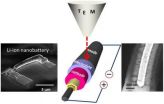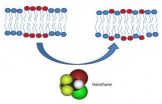(Press-News.org) CORAL GABLES, FL (March 21, 2012)—A team of researchers led by Michael H. Antoni, director of the Center for Psycho-Oncology Research at the University of Miami (UM) has shown that a stress management program tailored to women with breast cancer can alter tumor-promoting processes at the molecular level. The new study recently published in the journal Biological Psychiatry is one of the first to link psychological intervention with genetic expression in cancer patients.
According to the study, the group-based Cognitive-Behavioral Stress Management (CBSM) intervention designed by the researchers affects which genes in the cells of the immune system are turned on and off, in ways that may facilitate better recovery during treatment for breast cancer, explains Antoni, professor of Psychology in the College of Arts and Sciences, and professor of Psychiatry and Behavioral Sciences and program leader of Biobehavioral Oncology at the Sylvester Comprehensive Cancer Center at the University of Miami Miller School of Medicine.
"For the women in the CBSM groups, there was better psychological adaptation to the whole process of going through treatment for breast cancer and there were physiological changes that indicated that the women were recovering better," Antoni says. "The results suggest that the stress management intervention mitigates the influence of the stress of cancer treatment and promotes recovery over the first year."
Previous research has shown that during times of adversity, our nervous and endocrine systems send signals to the immune system, which defends us from disease. In response, our body activates specific genes inside immune cells called white blood cells or leukocytes, Antoni explains.
"For the women that participated in the intervention groups, the genes that signal the production of molecules associated with a healthy immune response, such as type I interferon were up-regulated—meaning they were producing more of these substances, compared to levels seen in the control group," Antoni says. "At the same time, the genes responsible for the production of substances involved in cancer progression, such as pro-inflammatory cytokines, chemokines and matrix metalloproteinases were down-regulated."
CBSM is a 10-week group-based program developed at UM that combines relaxation, imagery and deep breathing, along with cognitive behavior therapy, which is designed to help patients reduce bodily tension, change the way they deal with intrusive stressful thoughts, decrease negative moods, and improve their interpersonal communication skills. In the study, 79 women undergoing primary treatment for stage 0-III breast cancer were randomized into a 10 week CBSM program or a psychoeducational control group in the weeks following surgery. Six month and 12-month follow up assessments were conducted.
"You essentially have this timeframe in a woman's life where she is getting diagnosed with breast cancer, followed by surgery, then chemotherapy or radiation, and it's very stressful," Antoni says. "This can be an emotionally and physically exhausting period offering little opportunity for recovery. If stress affects the immune system in a negative way, then their recovery could be slowed down and those patients taking longer to recover may be at risk for poorer health outcomes. Conversely, if stress management intervention can reduce the impact of stress on the immune system then recovery may be hastened."
The research team plans to follow the women in this cohort to see if CBSM intervention and its effects on leukocyte gene expression are predictive of reoccurrence and/or long term health outcomes.
INFORMATION:
The study titled "Cognitive-Behavioral Stress Management Reverses Anxiety-Related Leukocyte Transcriptional Dynamics" was funded by the National Cancer Institute and The Pap Corps, Champions for Cancer Research.
Co-authors are Susan K. Lutgendorf, professor of Psychology, University of Iowa and Holden Comprehensive Cancer Center; Bonnie Blomberg professor of Microbiology and Immunology, and member of the Tumor Immunology and Biobehavioral Oncology programs at Sylvester; Charles S. Carver, professor and director of the adult program in the Department of Psychology and member of the Biobehavioral Oncology program at Sylvester; Suzanne Lechner, research assistant professor of Psychiatry and Behavioral Sciences and member of the Biobehavioral Oncology program at Sylvester; Alain Diaz, research associate, Department of Microbiology and Immunology, Miller School of Medicine; Jamie Stagl, graduate student in the Clinical Health Psychology program at UM; Jesusa M.G. Arevalo, research associate, UCLA School of Medicine, and Steven W. Cole, professor of Medicine, UCLA Molecular Biology Institute, Jonsson Comprehensive Cancer Center, and Norman Cousins Center for Psychoneuroimmunology.
The University of Miami's mission is to educate and nurture students, to create knowledge, and to provide service to our community and beyond. Committed to excellence and proud of the diversity of our University family, we strive to develop future leaders of our nation and the world. www.miami.edu
END
According to Cardinal Web Solutions, an Internet marketing firm in Atlanta, all business pages on Facebook will be converted to the Timeline format on March 30th 2012. While this may be the biggest change from a visual standpoint, the changes to features and the heretofore virtually unlimited versatility that has made Facebook an essential social media marketing tool will be a hard pill to swallow for many businesses.
Communications sent thru Facebook by businesses are being throttled to 16% per month of current Facebook fans that have "liked" your page. This ...
It turns out you can be too thin—especially if you're a nanoscale battery. Researchers from the National Institute of Standards and Technology (NIST), the University of Maryland, College Park, and Sandia National Laboratories built a series of nanowire batteries to demonstrate that the thickness of the electrolyte layer can dramatically affect the performance of the battery, effectively setting a lower limit to the size of the tiny power sources.* The results are important because battery size and performance are key to the development of autonomous MEMS—microelectromechanical ...
NEW YORK – March 21, 2012 – Research by Columbia Business School's Modupe Akinola, Assistant Professor, Management, and Wendy Berry Mendes, Associate Professor, Sarlo/Ekman Endowed Chair of Emotion, University of California San Francisco in Behavioral Neuroscience examines how increases in cortisol, brought on by an acute social stressor, can influence threat-related decision making. The researchers studied a group of police officers completing a standardized laboratory stressor and then afterwards the group completed a computer simulated threat-related decision making ...
Wilmington, DE— A team of researchers led by A. K. Rajasekaran, PhD, Director of the Nemours Center for Childhood Cancer Research, has shown that a key protein involved in cell function and regulation is stopped by a substance present in cigarette smoke. Their work is published online in the American Journal of Physiology - Lung Cell and Molecular Physiology.
Cigarette smoke is well recognized as a cause of lung cancer and is associated with many other forms of cancer in adults. Cigarette smoke has more than 4,000 components, many of which are linked to the development ...
Boulder, Colo., USA – Highlights include new entries to the special issues "Seeing the True Shape of Earth's Surface" and "Origin and Evolution of the Sierra Nevada and Walker Lane." Also online: 3-D modeling of the area in the Pacific Ring of Fire affected by the magnitude 8.1 earthquake on 29 Sept.; another article comparing three different 3-D modeling software packages; and the identification of ancient marine terraces in areas of dense tree cover using airborne LiDAR.
Abstracts for these and other Geosphere papers are available at http://geosphere.gsapubs.org/. Representatives ...
(Santa Barbara, Calif.) ––Thanks to the MESSENGER spacecraft, and a mission that took more than 10 years to complete, scientists now have a good picture of the solar system's innermost planet.
On March 17, MESSENGER (MErcury Surface, Space Environment, GEochemistry, and Ranging) completed its one-year primary mission, orbiting Mercury, capturing nearly 100,000 images, and recording data that reveals new information about the planet's core, topography, and the mysterious radar bright material in the permanently shadowed areas near the poles. The findings are presented ...
"Business owners are being squeezed from all angles. Rising gas prices, increased regulations and unemployment all affect the bottom line. When no one is hiring, more people begin starting their own businesses or become consultants. Basically, you have more people trying to get less business. And that means there's more competition. But there is one thing you can do to get a head start on your competition, and that's through innovation.
"Innovation isn't just about creating new products", says Julie Austin, whose company Creative Innovation, teaches businesses ...
STANFORD, Calif. — Scientists at the Stanford University School of Medicine have shown for the first time how brain function differs in people who have math anxiety from those who don't.
A series of scans conducted while second- and third-grade students did addition and subtraction revealed that those who feel panicky about doing math had increased activity in brain regions associated with fear, which caused decreased activity in parts of the brain involved in problem-solving.
"The same part of the brain that responds to fearful situations, such as seeing a spider or ...
Why does inhaling anesthetics cause unconsciousness? New insights into this century-and-a-half-old question may spring from research performed at the National Institute of Standards and Technology (NIST).* Scientists from NIST and the National Institutes of Health have found hints that anesthesia may affect the organization of fat molecules, or lipids, in a cell's outer membrane—potentially altering the ability to send signals along nerve cell membranes.
"A better fundamental understanding of inhaled anesthetics could allow us to design better ones with fewer side effects," ...
The alphabet of data processing could include more elements than the "0" and "1" in future. An international research team has achieved a new kind of bit with single electrons, called quantum bits, or qubits. With them, considerably more than two states can be defined. So far, quantum bits have only existed in relatively large vacuum chambers. The team has now generated them in semiconductors. They have put an effect in practice, which the RUB physicist Prof. Dr. Andreas Wieck had already theoretically predicted 22 years ago. This represents another step along the path ...




